[This post is participating in M.A. Peel’s Comedy Blog-a-thon.]
It may be immodest of me to identify, as my “purest comedic moment,” one that I helped to create. But when I try to think of one that I merely experienced, there are a thousand different ones vying for the top spot. On the other hand, of my own comedy there was a single moment that stands above the rest.
As I mentioned a few months ago, some friends and I won our ninth grade talent show with a comic act called “The Epiphany County Choir.” Wearing plaid flannel shirts, bad haircuts, and dumbfounded expressions, we pretended to be country bumpkins from Nebraska newly arrived in the Big Apple. We sang “When it’s hog-calling time in Nebraska” to much laughter and applause.

A short time later, through some connections of Chuck’s as I recall, we got a gig performing our Epiphany County Choir act in front of a studio audience on a local cable-access show. We arrived at the studio early on a Saturday morning excited and nervous, chatted a bit with the station manager, and then were shown onto the stage in front of our audience: a class of 2nd-graders from Harlem.
The show must go on. We gamely performed “Hog Calling Time” in character, but to say our humor was lost on them is giving too much credit to the connotative powers of the word “lost.” We left the stage and huddled in the waiting room with the station manager and the schoolteacher, who registered her displeasure at the choice of entertainment for her charges. She wanted to know if we had anything more age-appropriate to perform for her kids. 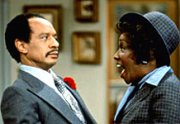 Chuck, apparently interpreting this to mean “race-appropriate,” indelicately suggested, “We do know the theme song from The Jeffersons.”
Chuck, apparently interpreting this to mean “race-appropriate,” indelicately suggested, “We do know the theme song from The Jeffersons.”
Because the world is funny, today Chuck is a professional diplomat.
Embarrassing at the time, that episode is funny in hindsight, and Chuck has gotten his share of ribbing for his gaffe, but that wasn’t my purest comedic moment. Read on.
We reprised our Epiphany County Choir act the following year to reasonable acclaim, with about twenty minutes of new material. The year after that we decided to stage our own hour-long show: “The Epiphany County Choir Home-For-Christmas Television Special” (in April).
Feeling we hadn’t sufficiently promoted the show in advance, we stood outside the entrance to our school on show day, lined up in our flannel shirts and in character, repeating the following in unison over and over and over for about forty-five minutes as students arrived for classes: “Come to the Epiphany County Choir Home-For-Christmas Television Special, 11:30 in the auditorium for free! Come to the Epiphany County Choir Home-For-Christmas Television Special, 11:30 in the auditorium for free! Come to the Epiphany County Choir Home-For-Christmas Television Special, 11:30 in the auditorium for free!” You try it, see how long you can keep it up.
The show included a performance of “Silver Bells” on a set of handbells; an Andy-Kaufman-style pantomime to a recording of “So Long, Farewell” from The Sound of Music; an a capella rendition of the theme music from The Odd Couple; an audience “sing-along” consisting of nothing but hand-clapping; and more. We were a hit; the crowd loved us.
But the coup de grace was the “Chud game.” Steve set the stage with a few minutes of (intentionally) bad stand-up about Chud, the neighboring county to Epiphany. “They call themselves Chuddites over there,” he told the audience with barely suppressed mirth, “but we just call ’em Chuds!” (Whereupon we in the Choir crack up.) There followed several supposedly disparaging Chud jokes — e.g., “How many Chuds does it take to screw in a light bulb? Fifteen!” — and then our helpers distributed Chud cards to the audience members.
The night before, we had drawn up hundreds of Chud cards by hand. These were Bingo cards, but with four columns apiece, labeled C, H, U, and D. Each card was different, just like real Bingo cards, but they were all rigged to win simultaneously when we called the four prearranged “Chud numbers.” I should mention that this was more than a year before “C.H.U.D.” stood for Cannibalistic, Humanoid Underground Dwellers.
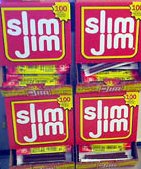 After the Chud cards were distributed, Steve announced that the winner would receive a prize. The prize was beef jerky. A few days earlier, Andrew and I had gone to a snack-food wholesaler to buy enough beef jerky for the whole audience.
After the Chud cards were distributed, Steve announced that the winner would receive a prize. The prize was beef jerky. A few days earlier, Andrew and I had gone to a snack-food wholesaler to buy enough beef jerky for the whole audience.
I cranked the handle of a genuine Bingo cage we had secured from somewhere, and I handed the chosen numbers to Steve one at a time. Although he made a big show of trying to read the numbers off the balls, of course he didn’t actually; instead he announced the numbers we had arranged the night before. “C-8!” “U-32!” “D-49!” By the third number it was obvious to the audience what we were up to and they began laughing and clamoring. Steve threw an unrehearsed curveball, announcing a number we hadn’t planned, and I was momentarily furious with him, worried that someone might prematurely win the game — but no, he succeeded in building a little suspense.
When he finally announced, “H-18!” the entire audience jumped to its feet and roared, “CHUD!” in unison. Somewhere there is video footage of me, Steve, and the others in the Choir with perfectly astonished looks on our faces as the crowd dissolved into screaming laughter. (We never could have pulled it off without cracking up ourselves if we hadn’t stayed awake the entire night before, preparing the show and rehearsing, making ourselves weary and slightly sick from too much beef jerky.) In my wildest dreams I could not have imagined causing such merriment or producing such a response. It was my purest comedic moment.
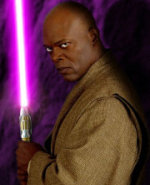 The record is not too favorable for the good guys. In fact it looks like the only good guy who wins while acting like a good guy is Mace Windu! You see, this cat Mace is a baaaad mother– Shut yo mouth! But I’m talkin’ ’bout Mace! Then we can dig it.
The record is not too favorable for the good guys. In fact it looks like the only good guy who wins while acting like a good guy is Mace Windu! You see, this cat Mace is a baaaad mother– Shut yo mouth! But I’m talkin’ ’bout Mace! Then we can dig it.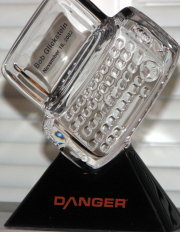
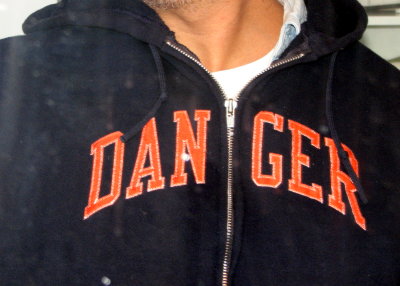
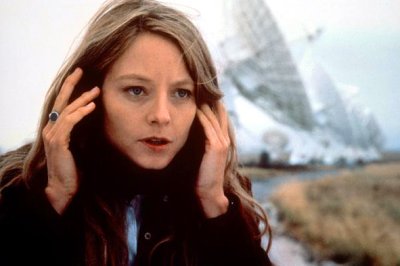
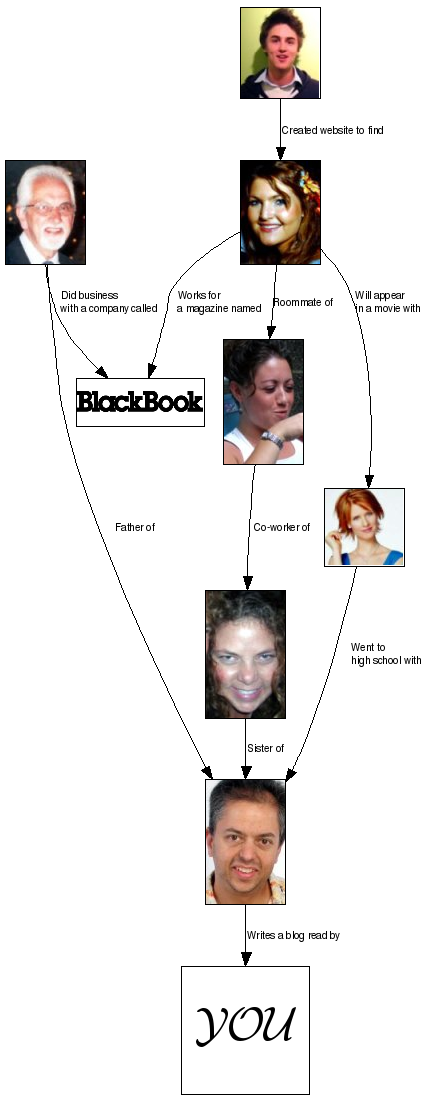

 Chuck, apparently interpreting this to mean “race-appropriate,” indelicately suggested, “We do know the theme song from
Chuck, apparently interpreting this to mean “race-appropriate,” indelicately suggested, “We do know the theme song from  After the Chud cards were distributed, Steve announced that the winner would receive a prize. The prize was beef jerky. A few days earlier, Andrew and I had gone to a snack-food wholesaler to buy enough beef jerky for the whole audience.
After the Chud cards were distributed, Steve announced that the winner would receive a prize. The prize was beef jerky. A few days earlier, Andrew and I had gone to a snack-food wholesaler to buy enough beef jerky for the whole audience.